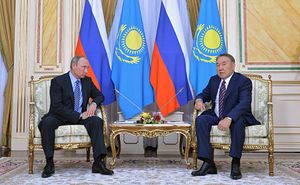Meeting for the 8th time this year, Russian President Vladimir Putin and Kazakh President Nursultan Nazarbayev exchanged pleasantries like old friends in Astana. The two leaders met on the sidelines of the Russian-Kazakhstan Business Forum, itself part of the 13th Russia-Kazakhstan Interregional Cooperation Forum. They also attended a film screening together.
Nazarbayev congratulated Putin on the “good results” of the recent elections, which saw Putin’s United Russia party gain an absolute majority in the State Duma. Although the party captured 343 out of 450 seats, voter turnout across Russia was low, estimated at 48 percent.
“I believe this is a major victory for you, for Russia, for its stable development,” Nazarbayev told Putin.
For comparison: Nazarbayev’s Nur Otan party won 84 of 98 seats in the Majilis (Kazakhstan’s lower parliamentary house) in snap polls earlier this year. Turnout for that election reached 77 percent, paling next to the 95 percent which turned out for last year’s presidential elections (International observers have questioned the fairness of Kazakhstan’s elections, unsurprisingly observers from the CIS saw no problems). Nazarbayev, the last Soviet-era leader still alive, lauded Putin’s influence, saying “you have done brilliantly.”
Putin thanks Nazarbayev for inviting him to Astana and noted that “relations between Russia and Kazakhstan certainly have the qualities of an alliance and a strategic partnership.” Putin referenced “problems caused by objective circumstances,” a roundabout way of referring to external economic pressures, like the 2014 crash in oil prices and Western sanctions.
In his speech at the business forum, Putin went further, complimenting Astana–“beautiful and interesting”–and lauding Kazakhstan, Russia, and the Eurasian Economic Union for progress on trade liberalization.
“Together with other partners in the Eurasian Economic Union, we continue to eliminate restrictions that can obstruct the movement of goods, services, capital and the workforce; but there are more to deal with,” Putin said.
By way of illustration he mentioned his visit to Orenburg, a city founded in 1735 as a fortress city on the frontier, a base for Imperial Russia’s expansion into Central Asia. Now Orenburg sits on the Russian-Kazakh border. The two states have been in a customs union since 2010, eclipsed in 2015 by the launching of the Eurasian Economic Union. Still there remain, as Putin mentioned, restrictions and trade is beset by insufficient infrastructure and border bottlenecks. In reference to Orenburg, Putin said, “the road has been built on the Kazakhstan side, but unfortunately, not on the Russian side.”
One road is not all that is lacking. Trade between Kazakhstan and Russia has fallen over the past few years. According to Putin, in 2015, “trade turnover totalled $15.5 billion.” Putin continued:
Yes, indeed, as the President of Kazakhstan noted today, trade has unfortunately declined, mainly due to various market factors, especially the continuing instability on global markets, exchange rate fluctuations and the high volatility of raw material prices. These are the obvious objective variables
This is a far cry from 2013, when trade turnover between Kazakhstan and Russia reached $28.5 billion. That high was followed by a 20 percent decline in 2014. Kazakhstan’s trade turnover with all of the EEU states continued to slide in 2015.
Nonetheless, both Nazarbayev and Putin hailed bilateral business prospects, with Putin promising financial support for joint business ventures. According to Kazinform, a state media agency, the business forum was expected to feature the signing of 40 bilateral agreements worth $27 billion. Sputnik mentioned 27 agreements worth $4 billion–illustrating the functional meaningless of such statistics. Whatever the amount, Kazakhstan and Russia remain close allies buffeted by their own bad arrangements and depressed economies.

































